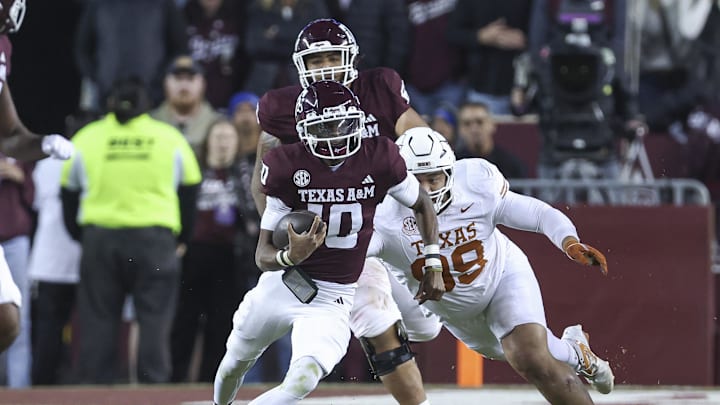After sitting atop the SEC as kings of the conference, controlling their own destiny for a berth in Atlanta and the College Football Playoff, the Aggies' 1-4 stretch from November into the bowl game was quite the unpleasant wakeup call for A&M fans.
It started with a shellacking in Columbia, South Carolina against the East Coast USC and ended with a whimper against the West Coast USC in Las Vegas, as the Trojans came back from a huge deficit to win the game against Texas A&M. All four of the losses looked quite different, but all were equally displeasing to Aggie fans.
This spate of poor performances by the Aggies coincided with Marcel Reed's full-time taking of the reins at quarterback, which has led to some pretty awful takes from the A&M faithful and the general public. That in mind, let's get the record straight on what the issue with the Aggies' skid in the final five games of the year actually was.
Marcel Reed is not to blame for Texas A&M's late-season losing ways in 2024
To my mind, there are two chief reasons that the Aggies played so poorly in the latter part of the year, and neither of them are Marcel Reed. Reed was playing his best ball as a quarterback in the last five games of the year— despite conspiratorial zaprudering of game tape to see whether Reed lined up his legs in different fashions on pass or run plays, or the laughably vague concept that teams "had time to prepare for him," no. 10 was putting his best foot forward.
In fact, his two best games as a passer, against Auburn and USC, both occurred in the Aggies' final three games. He led A&M back to take a lead in the final moments of each game, driving down the field in the fourth quarter to leave the opposing team with precious little time left.
However, the first reason for A&M's late-season collapse lay latent in each case, waiting to foil his heroics. The porous A&M secondary had begun to crack in a major way, and both Auburn and USC were able to take advantage, scoring with little or no time left on the clock to move the game to overtime or win, respectively.
The other reason that the Aggies lost those games in particular— and, for that matter, against South Carolina as well— was the lack of Le'Veon Moss. Without no. 8, the Aggie run game looked positively lifeless at times. They needed much more juice than an injured Amari Daniels and Rueben Owens could provide, hampering Klein's offense mightily.
If I had to credit one thing, it would be the defensive regression first and foremost, which is definitely a concern headed into the upcoming year. Hopefully, some of the hires and changes Mike Elko has made in the offseason pay off in a big way on that side of the ball.
